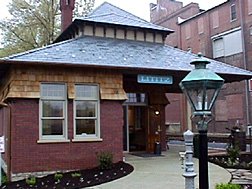Commentary: Bordens sought sameness

I have driven through Lancaster County in Pennsylvania. It is a semi-rural, sometimes sylvan area of dairy farms and modest businesses. The Amish provide local color. Lititz is best known for its chocolate factory, Wilbur Chocolate Company, as is Hershey. There are also some mock Bavarian buildings that draw attention. It took centuries for the population of Lititz to grow to its current 9,000 or so. Michael and Cathryn Borden, the couple apparently slain by their young daughter Kara's boyfriend, David Ludwig, last Sunday, relocated from South Carolina to Lititz seven to ten years ago. (Accounts differ.) Why would people move there? Most people wouldn't. Jobs are relatively scarce and often involve commutes to cities 30 minutes to an hour away. There's little in the way of cultural attractions. Still, there are reasons for a certain type of people to want to live in Lititz. What type? People who seek sameness. Census data explain.
As of the of 2000, there are 9,029 people, 3,732 households, and 2,407 families residing in the borough. The population density is 1,502.6/km² (3,884.0/mi²). There are 3,827 housing units at an average density of 636.9/km² (1,646.2/mi²). The racial makeup of the borough is 97.23% White, 0.44% African American, 0.09% Native American, 0.87% Asian, 0.03% Pacific Islander, 0.50% from other races, and 0.83% from two or more races. 1.52% of the population are Hispanic or Latino of any race.
The median income for a household in the borough is $40,417, and the median income for a family is $52,028. Males have a median income of $36,126 versus $25,997 for females. The per capita income for the borough is $20,601. 4.1% of the population and 2.6% of families are below the poverty line. Out of the total population, 3.9% of those under the age of 18 and 8.7% of those 65 and older are living below the poverty line.
People who want everyone in their environment to look like them would probably find a town like Lititz reassuring. Philadelphia is only 60 miles away, but it might as well be on Mars for families who have opted out of the diversity of urban America. If you read between the lines, the data on gender and income is also telling. Women who work in Lititz earn only two-thirds of the income men do.
There is another reason why a couple like the Bordens would seek out Lititz. It is a haven for white fundamentalist and evangelical Christians, many of whom homeschool. And estimated one in ten children in Lancaster County is schooled at home.
A network of homeschool organizations has sprung up to provide support to the families in the form of tutoring, field trips for children and social gatherings. Most exclude non-Christian home schoolers. Some groups require that people sign agreements supporting their specific religious beliefs in order to participate. The groups are an alternative to allowing homeschooled children to mingle with those who participate in the public school system, which many Christian homeschoolers view with skepticism, if not contempt. A new state law that will allow homeschooled children to participate in extracurricular activities with public school pupils has met with ambivalence.
Parent Suzanne Ritchey is “torn.”
Ritchey lives just outside Neffsville and homeschools her four children.
On one hand, her family pays taxes, and her boys might want to play baseball for Manheim Township School District when they outgrow the recreation commission.
On the other hand, “Our family believes it’s best to rely solely on God and not usurp authority to the public school system,” Ritchey said.
The Bordens, members of a small reactionary sect known as the Plymouth Brethren, would have been particularly susceptible to such rigidity. The sect, founded in Ireland and England, is focused on strict adherence to 19th century tenets of Christianity and has an apocalyptic outlook. It does not recognize clergy, treating middle-aged and older men as leaders. Women are discouraged from playing an active role in worship and from working outside of the home.
Coverage of the Borden murders and ensuing investigation are rife with locals who declare the Bordens and Ludwig's the 'right kind of children'-- conservative and Christian.
"They were good kids and they were brought up very well. What I see is, they just made some bad choices," said Vera Zimmerman, 50, who has known the Bordens for seven years and is acquainted with Ludwig's mother.
Kara has been described by neighbors and friends as a bubbly, outgoing girl who occasionally baby-sat younger children in her neighborhood and liked to play soccer. She regularly attended youth group meetings and got along well with her sister, said Kevin Eshleman, executive pastor of Ephrata Community Church.
"In my mind, that generally indicates that things are going OK at home," Eshleman said.
Of course, the details emerging contradict the claim that all is well among the Christian homeschooling community there. At least one young teen who apparently stayed out all night with a man. A cache of 54 weapons in the Ludwig home. Video of another planned home invasion. Rumors that Kara Borden is at least the second girl that Ludwig has run off with. A conspiracy among homeschooled teens to keep information about the relationship between Kara Borden and Ludwig secret from adults.
The Bordens achieved their goal of living in a place where most people looked like them and thought like them. A large minority joined them in eschewing public and private education for their children, considering homeschooling superior because of its insular nature. But, they were not saved by sameness. Victims of violent crime usually know the offender -- a family member, friend or acquaintance. However, for some reason, perhaps cognitive dissonance, many people believe that trouble usually comes from outsiders. Cleave to sameness and shut out the Other, and you will be safe, they think. In Lititz, trouble has come from deep within.
What's the art?
A picture of Lititz Springs Park and Visitors Center.